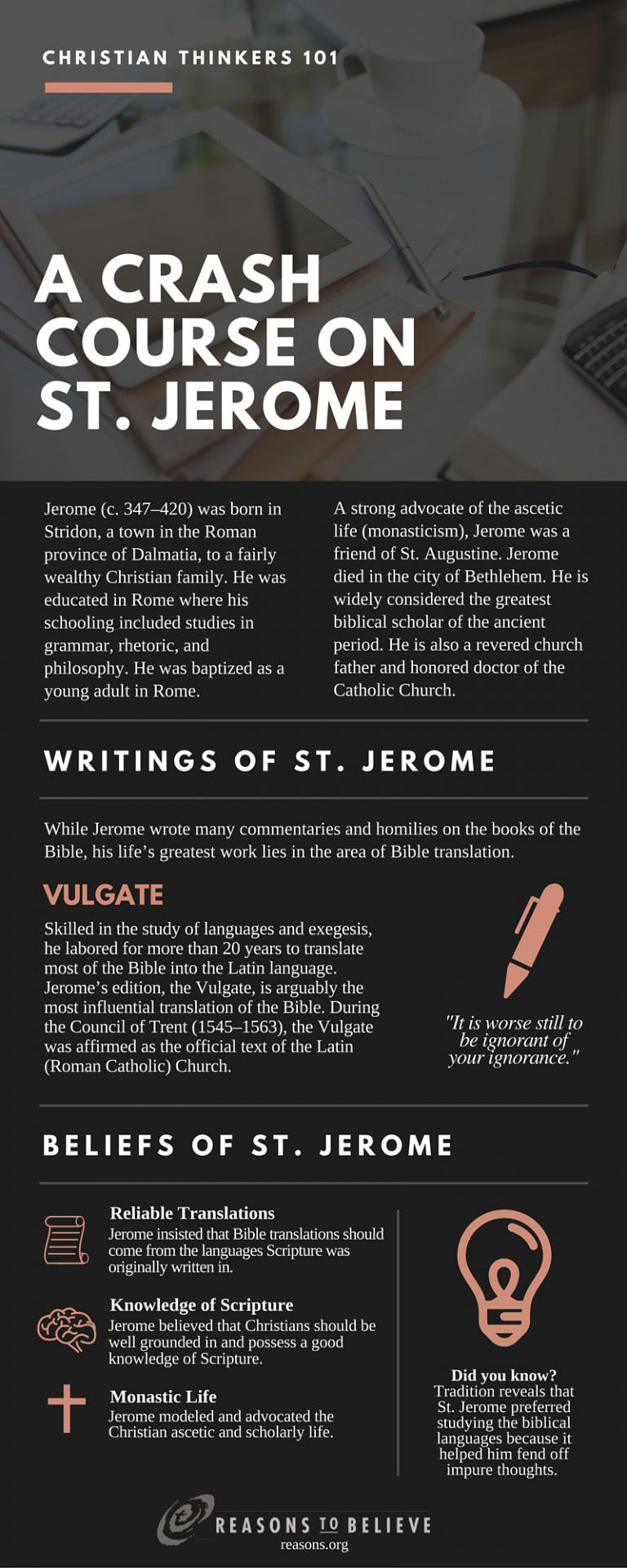Christian Thinkers 101: A Crash Course on St. Jerome
Tradition reveals that St. Jerome preferred studying the biblical languages because it helped him fend off impure thoughts. But who was this ancient Christian monk, and what is his enduring legacy in terms of historic Christianity? Here’s your crash course on the life and accomplishments of St. Jerome—and why he still matters today.
Who Was Jerome?
Jerome (ca. 347–420) was born in Stridon, a town in the Roman province of Dalmatia (thought to be in modern-day Croatia or Slovenia), to a fairly wealthy Christian family. He was educated in Rome where his schooling included studies in grammar, rhetoric, and philosophy. He was baptized as a young adult in Rome and later studied under the Eastern Cappadocian theologian Gregory of Nazianzus. A strong advocate of the ascetic life (monasticism), Jerome was a contemporary and friend of St. Augustine. Jerome died in the city of Bethlehem. He is widely considered the greatest biblical scholar of the ancient period. He is also a revered church father and honored doctor of the Catholic Church.
What Did Jerome Write?
While Jerome wrote many commentaries and homilies on the books of the Bible, his life’s greatest work lies in the area of Bible translation. Skilled in the study of languages and exegesis, he labored for more than 20 years to translate most of the Bible into the Latin language. Jerome’s edition, the Vulgate, is arguably the most influential translation of the Bible. During the Council of Trent (1545–1563), the Vulgate was affirmed as the official text of the Latin (Roman Catholic) Church.
What Did Jerome Believe?
St. Jerome was orthodox in his theology and was a defender of historic Christianity. However, his greatest contributions to the faith came in terms of biblical studies and translation.
- Jerome insisted that Bible translations should come from the languages Scripture was originally written in. For example, instead of relying on the popular Greek translation of the Hebrew Scriptures of the time (the Septuagint), Jerome utilized ancient Hebrew copies that he considered more reliable.
- Jerome believed that Christians should be well grounded in and possess a good knowledge of Scripture. In his commentary on Isaiah, Jerome stated: “Ignorance of Scripture is ignorance of Christ.”
- Jerome modeled and advocated the Christian ascetic and scholarly life. The life of a monk seems well suited for a Bible translator.
Why Does Jerome Matter Today?
Jerome is sometimes referred to as the most unsaintly saint for his often surly temperament and for his habit of using sarcasm and invectives toward others. However, Jerome was also candid in admitting his faults, and though he was one of the greatest Christian scholars of the ancient world, he was not given to ambition.
Jerome’s translation of the Bible, the Vulgate, is his enduring scholarly legacy. The Vulgate insured that the language of Christian theology would remain Latin for more than a thousand years. Not only competent in Hebrew, Greek, and Latin, Jerome was known for his great care in the use of language sources. St. Jerome is arguably the greatest figure in the long history of Bible translation. Evangelicals can relate to Jerome for his love and respect of Scripture. They can also extend respect to him for his careful work in attempting to preserve God’s written Word.
Other articles in the Christian Thinkers 101 series: St. Augustine; C. S. Lewis; Blaise Pascal; St. Anselm; St. Athanasius; St. Thomas Aquinas; Jonathan Edwards; Søren Kierkegaard; St. Bonaventure; Martin Luther; John Calvin; Irenaeus; Tertullian; St. Basil; Justin Martyr; Walter Martin; Ronald Nash; Mortimer Adler
Reflections: Your Turn
In reflecting upon Jerome’s statement that “ignorance of Scripture is ignorance of Christ,” what is your commitment in terms of reading and studying the Bible? Visit Reflections on WordPress to comment with your response.
Resources
- For a discussion of St. Jerome’s life, writings, and teaching, see pages 140–51 in The Fathersby Pope Benedict XVI.
- For a brief summary of St. Jerome’s life and accomplishments, see pages 45–47 in A Concise History of Christian Thought by Tony Lane.








